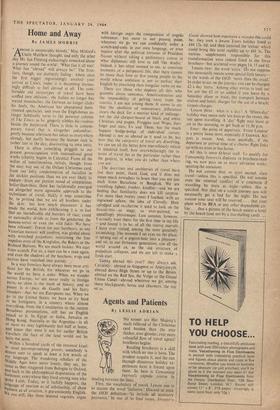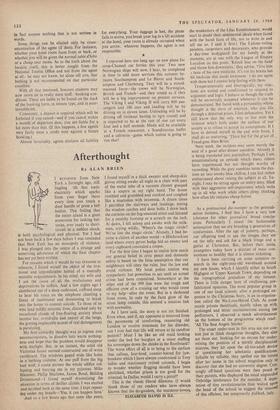Agents and Patients
By LESLIE ADRIAN
No sooner are Her Majesty's mails relieved of the Christmas card burden than the ever thicker, ever glossier, ever more colourful flow of travel agents' brochures begins.
Reading brochures is a skill with which no one is born. The prudent acquire it, and the rest through disastrous holiday ex- periences have it forced upon them. So here is Consuming Interest's capsule course in reading between the lines.
First, the vocabulary of travel. Lesson one is to master the word 'inclusive.' Discard at once the OED definition—'to include all accessory payments.' In one of its final issues, Shopper's Guide showed how expensive a mistake this could be: they took a Swans Tours holiday listed at £44 I 2s. 6d. and then itemised the 'extras' which could bring this total rapidly up to £61 3s. The various supplements responsible for this transformation were indeed listed in the Swan brochure—but scattered over pages 14, 15 and 42.
Lesson two: the word 'extra.' Do not suppose this necessarily means some special little luxury— in the words of the OED, 'more than the usual.' In order to eat on the journey you can be charged £2 a day 'extra.' Among other extras to look out for are the £2 or so added it' you leave by a Saturday plane or train; the transport between station and hotel; charges for the use of a beach; airport charges.
Lesson three: what is a day? A 'fifteen-day' holiday may mean only ten days at the resort, the rest spent travelling. A 'day' flight may leave at six in the morning, or get back at 11.30 p.m.
Four: the point of departure. 'From London' is a pretty loose term, especially if Gatwick Air- port is meant. And, most painfully, if the departure or arrival time of a charter flight links • up with no train or bus home.
All this is mere 0-level stuff. To qualify for COnsuming Interest's diploma in brochure-read- ing, we now pass on to more advanced work: spotting the omissions.
Do not assume first, or even second, class travel—Onless this is specified. Do not assume even the minimal comfort of a couchette if travelling by train at -night—unless this is specified. Nor that on a coach journey you will necessarily get a bed for the night. Do not assume your seat will be reserved . . that your plane will be BEA or any other dependable air- line ... that a picture of the beach means a hotel by the,.beach (and not by a Marshalling yard) ....
in fact assume nothing that is not written in words.
Some things can be elicited only by cross- examination of the agent (if then). For instance, whether your hotel room faces front or back, or whether you will be given the normal table d'hôte or a cheap tour menu. As to the truth about the locality itself, this is better sought from • the National Tourist Office and not from the agent at all: he may not know, let alone tell you, that bathing is not recommended on that particular coastline.
With all that mastered, honours students may now move on to really stern stuff : booking con- ditions. These are liable to be found on the back of the booking form, in minute type, and in near- invisible ink.
Commonly, a deposit is required which will be forfeited if you cancel—and if you cancel within a month of departure date, you are liable for a lot more than that. (If this happens, a few agents very fairly issue a credit note against a future booking.) Almost invariably, agents disclaim all liability for everything. Your luggage is lost, the plane fails to arrive, you break your leg in a lift accident at the hotel, your room is already occupied when you arrive: whatever happens, the agent is not responsible.
I ,reported here not long ago on new plans for cross-Channel car ferries this year. Two new Norwegian ships will now, 1 bear, be completed in time to add more services this summer be- tween Southampton and Le Havre and South- ampton and Cherbourg. They will be a mixed- manned force—the crews will be Norwegian, British and French—and they sound as if they will be a big improvement on present services. The Viking I and Viking II will carry 800 pas- sengers and 180 cars and loading will be by driving on in eleven lanes. Unloading will be by driving off (without having to up round) and is expected to be at the rate of one car every four and a half seconds. Meals will be available at a French restaurant, a Scandinavian buffet and a cafeteria—guess which nation is going to run that!



































 Previous page
Previous page